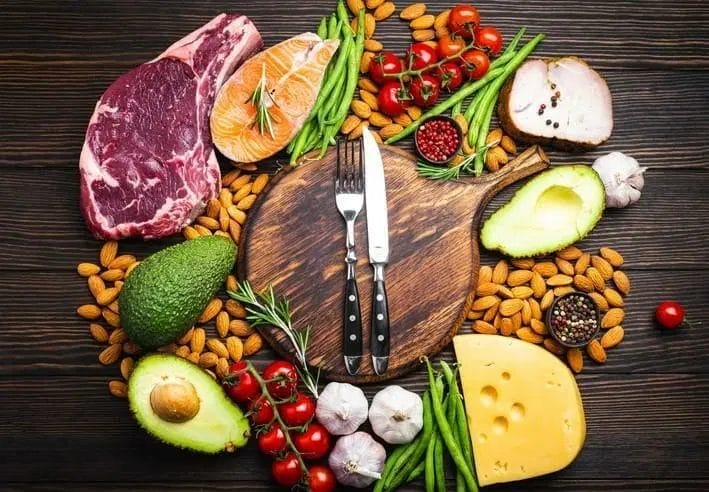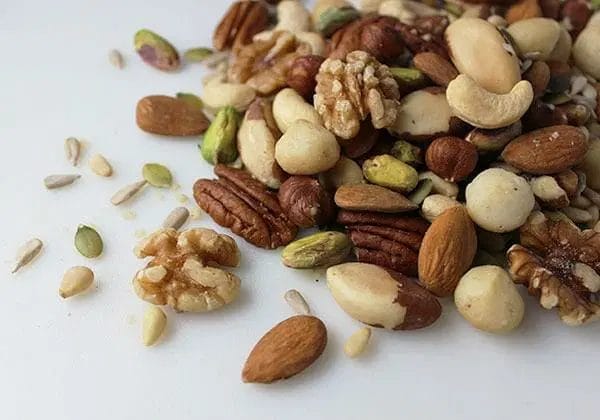The term “nutrient density” refers to unprocessed, fresh food rich in a high variety of nutrients that are easily available to the human body. This means the digestive system can use the nutrients right away and keep the body healthy and energized for longer periods of time.
Best Nutrient dense foods are great for weight loss, weight maintenance, or improving certain health conditions. Because they’re so rich in nutrients, these foods are considered superfood powerhouses.
Keep reading to discover 5 of the most nutrient dense foods you should consider adding to your diet.
What Are Nutrient Dense Foods?

Any food that contains a high amount of important nutrients, whether it’s protein, healthy fats, or complex carbs, can be considered nutrient dense food. If you’re trying to become healthier or lose weight, eating nutrient dense foods will give you longer-lasting energy.
Instead of eating only low-fat ingredients, start implementing nutrient dense foods into your diet. Some of the most nutrient dense foods include fruits and vegetables, but free-range eggs, raw nuts, and grass-fed meat are other great nutrient dense options.
| Nourishment | Provide the vital nutrients your body needs to function properly. |
| Vitality | The nutrients in these foods fuel your body’s processes and help you feel more energetic and alert throughout the day. |
| Disease Prevention | Often associated with a reduced risk of chronic diseases. |
| Weight Management | Typically lower in calories but higher in volume and satiety compared to calorie-dense, processed foods. Incorporating these foods into your diet can help you feel full and satisfied, making it easier to manage your weight. |
| Gut Health | Rich in dietary fiber, which is essential for maintaining a healthy gut. |
| Cognitive Function | Certain nutrients found in nutrient-dense foods, such as omega-3 fatty acids and antioxidants, have been linked to improved cognitive function, memory, and brain health. Including these foods in your diet may support your brain as you age. |
| Bone Health | Contain high levels of calcium, vitamin D, and other nutrients crucial for maintaining strong |
| Skin and Hair | The vitamins and minerals present in nutrient-dense foods play a role in promoting healthy skin and hair. |
| Longevity | The nutrients in these foods help protect cells from damage, slow down the aging process, and support overall longevity. |
| Balanced Lifestyle | It focuses on nourishing your body with wholesome choices rather than fixating on restrictions, leading to a more positive relationship with food. |
Best Nutrient Dense Foods
1. Fatty Fish
Fatty fish have a special place on the nutrient dense foods list because they’re rich in omega-3 fatty acids. These fatty acids are important for optimal heart health, brain health, and healthy organs. Other nutrients in fatty fish include high-quality protein, as well as vitamins and minerals such as vitamin D, vitamin A, magnesium, zinc, iodine, phosphorus, and selenium.
The fatty fish family includes:
- Wild salmon
- Tuna
- Mackerel
- Sardines
- Herring
- Shrimp
- Anchovies
- Scallops
In order to get the most benefits from fish, it should be prepared the right way so as not to lose important nutrients in the process of cooking. If you’re not sure how to prepare fish or prefer professionals to do it for you, the team at Dinner Dude will make sure your fish is fresh, cooked to perfection, and suited to your taste.
Try to consume freshly-caught fish and seafood whenever possible instead of frozen. At least 2-3 meals in your week should consist of fatty fish or seafood.
2. Nuts and Seeds

Nuts and seeds are rich in healthy fats, high-quality protein, dietary fiber, and complex carbs. They’re considered “superfood” due to their high nutritional value, but they also contain many vitamins and minerals.
The most nutrient-rich nuts and seeds include:
- Walnuts
- Hazelnuts
- Peanuts
- Almonds
- Cashews
- Pumpkin seeds
- Chia seeds
- Flax seeds
- Sesame seeds
- Sunflower seeds
A handful of nuts and seeds each day will give you a boost of healthy energy, especially if you’re doing a demanding activity. Nuts and seeds are rich in healthy fats, but they won’t spike your blood sugar levels, which means you’ll give the body pure ready-to-use energy.
3. Leafy Greens
Leafy greens are among the healthiest, most nutrient dense foods on the planet. They’re not only a great foundation for salads, but they should be an essential part of every meal. Because of their incredible nutritional profile, leafy greens are the perfect addition to smoothies and juices. When mixed with fruits and sweeteners, it won’t even feel like you’re consuming vegetables with your smoothie.
Leafy greens will help you stay full for longer periods of time, help digest food better, and can lower your blood pressure. Regular consumption of leafy greens with every meal can reduce the risk of cardiovascular diseases, stroke, digestive problems, and most types of cancer.
The healthiest green leafy vegetables include:
- Spinach
- Kale
- Collard greens
- Arugula
- Watercress
- Swiss chard
- Romaine lettuce
- Turnip greens
You’ll find a wide variety of vitamins and minerals in leafy greens such as vitamin C, vitamin K, vitamin A, potassium, iron, folate, calcium, and magnesium. Make sure to wash each leaf separately to remove any dirt, dust, bugs, and pesticides. Then, place the leafy greens in a salad spinner to remove excess water and they’re ready for serving.
4. Lean Grass-Fed Meats and Pastured Poultry
Lean meats and poultry are rich sources of healthy high-quality protein, which is an essential part of a nutrient dense meal. Poultry such as turkey and chicken is rich in the B group of vitamins, especially vitamin B6 and B3 that contribute to a healthy nervous system. Because lean meats are so rich in protein, you can use them as a main protein source in almost any dietary plan.
The most nutrient dense poultry and lean meats include pasture-raised/grass-fed beef, chicken, lamb, turkey, and venison. To get the most benefits and nutrients from lean meats, try to stay away from store-bought mass-produced meats, unless they’re organic, grass-fed, or free-range.
Curious to see how we use lean meats and poultry in our meals?
5. Dark Chocolate
Dark chocolate might not be a typical part of a nutrient dense diet, but its nutritive properties say otherwise. High-quality dark chocolate is one of the richest sources of antioxidants on the planet. This means it can help fight free radicals in the body that come from air pollution, unhealthy food, and stress, thus reducing the risk of cancer and other malignant tumors.
Eating 1-2 pieces of dark chocolate a day will give you a healthy energy boost without causing huge spikes in blood sugar levels. Go for dark chocolate with at least 72% cocoa content. Sugar-free chocolate or one sweetened with stevia is a great healthy snack when you need a pick-me-up while working or studying.
Conclusion
Incorporating nutrient-dense foods into your diet is a vital step towards achieving optimal health and well-being. The journey to better nutrition doesn’t have to be complicated or restrictive; it can be as simple as adding a few key foods that pack a powerful nutritional punch. Spinach, salmon, quinoa, blueberries, and almonds stand out as some of the best choices for enhancing your diet with a variety of essential vitamins, minerals, and other health-promoting compounds.
By embracing these nutrient-dense options, you’re not only nourishing your body but also taking proactive measures to support various aspects of your health. From strengthening bones and boosting immunity with spinach to promoting heart and brain health with salmon’s omega-3 fatty acids, each of these foods offers a unique set of benefits. Quinoa provides complete protein and fiber for sustained energy and muscle support, while blueberries’ antioxidants aid in protecting your cells from damage and supporting cognitive function. Almonds contribute heart-healthy fats and skin-loving vitamin E, making them a satisfying addition to your daily routine.
Remember, a balanced diet is all about variety. Incorporating these nutrient-dense foods doesn’t mean you have to exclude other favorites. Rather, it’s about creating a well-rounded meal plan that prioritizes the nutrients your body needs most. So, whether you’re enjoying a quinoa salad, a salmon fillet, or a handful of almonds, each choice brings you closer to your health goals.
As you embark on this nutritional journey, consider the long-term benefits that these choices can offer. Improved energy levels, a stronger immune system, and enhanced overall well-being are just a few of the rewards awaiting you. So, go ahead and savor the flavors and benefits of these nutrient-dense foods, knowing that each bite is a step towards a healthier and happier you.
Improve Your Diet, Improve Your Health With Dinner Dude!
Whether you’re trying to eat healthier or want to lose weight, a diet rich in nutrients can be exactly what you need to reach your goals. From nuts and seeds to use in your breakfast smoothies to leafy greens that go with every meal, food can become your main source of optimal health if you know what to eat.
Ready to eat healthy, nutrient dense foods ready-made for you? Make your first Dinner Dude order today and let us do the cooking so you don’t have to.